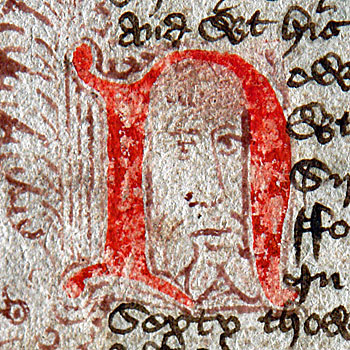Richard Coeur de Lion
General Information
Plot Summary

After a discussion of different romances, the poem describes how King Henry of England marries Cassiodorien, the mysterious princess of Antioch, and has three children. For fifteen years she avoids attending mass, but when an Earl complains Henry makes her watch the ceremony. She flies away through the church roof and the distraught Henry abdicates, making his eldest son, Richard, king. The new king holds a tournament, testing his knights by fighting in disguise. When two of them, Fouke Doly and Thomas of Multon, stand out, Richard suggests that they travel to the Holy Land disguised as pilgrims. On their return journey the three knights are imprisoned by the king of Almayne. After Richard kills his son and seduces his daughter, the king sets a lion on him: Richard rips out the beast’s heart and eats it, earning the name Coeur de Lion. England’s churches provide his ransom and he returns home.
After six months Richard decides to join the Crusades and leaves England with a vast army. They travel via Almayn to Messina, where Philip, King of France, attempts to betray Richard. The English attack the city with a siege engine, ceasing only when begged by an archbishop. They continue to Cyprus, where the Emperor loots several of their ships and abuses Richard’s messengers. His long-suffering steward lets Richard into the city and he imprisons the treacherous Emperor, appointing an English regent before continuing to Acre.
Richard’s ships enter the harbour, using fireworks and a demonic looking mill to terrify the Saracens. The Christian kings, who have been besieging the city for seven years, recount their terrible losses and Richard begins a savage attack on Acre. He breaks down the outer walls, but when Saladin’s men attack from behind, the Christians lose their advantage. Richard falls seriously ill and demands pork. When none can be found, his men kill a young, fat Saracen and serve his cooked flesh to the king. His strength restored, Richard rejoins the battle, driving back Saladin’s men. When he asks for the head of the ‘pig’, he is shown the Saracen and laughs. Refusing Saladin’s peace terms, he has his high-status prisoners killed and serves their heads to the Sultan’s horrified delegates, stating that Christians cannot be broken by hunger. Urged on by his terrified men, Saladin again attempts to make peace with Richard, who demands the True Cross. When the Saracens deny that they have it, Richard has almost all his prisoners executed.
The war continues. Richard, Moulton and Fouke capture cities using ingenious siege techniques, and slay all their inhabitants. When the Christians regroup at Acre, however, it emerges that the French have spared Saracen lives in return for treasure. Richard curses Philip and retraces his steps, destroying the rebellious cities. The Christians are ambushed as they proceed to the coast, but are rescued by a vision of St George. Richard defeats the Saracens in the battle of Arsour and Saladin flees to Babylon. The Christians follow him, capturing many other towns on the way. They lay siege to the city until Philip accepts a profitable truce and withdraws. Saladin attempts to kill Richard by giving him a demonic horse, but the King tames it with the help of an angel and rides it into battle, defeating the Sultan who flees again. Philip and the French return home, as does the Duke of Austria.
Richard’s army continues towards Jerusalem, conquering more cities on their way, until he hears that his brother John is usurping the English crown. After a few more victories he turns back, leaving his men at Jaffa. Saladin attacks the city with such force that Richard is compelled to return, fighting his greatest battle and saving his men. Advised by another angel, he agrees a three year truce with Saladin, makes a pilgrimage to Jerusalem and sets out for England. He is slain on his way, having been king for only ten years.
From: Karl Brunner, ed. Der Mittelenglische Versroman über Richard Löwernherz. Vienna and Leipzig: Wilhelm Braumüller, 1913.
Manuscripts
Click a title below to search for all romances in that manuscript.